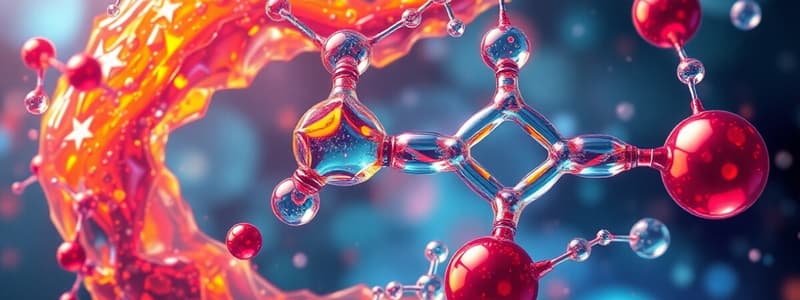Podcast
Questions and Answers
What is the result of the hydration of an alkyne in the presence of H2O and HgSO4?
What is the result of the hydration of an alkyne in the presence of H2O and HgSO4?
- Formation of an unstable carbocation
- No reaction occurs
- Formation of a ketone through tautomerism (correct)
- Direct formation of an alcohol
Which statement accurately describes the mechanism of alkynes hydration?
Which statement accurately describes the mechanism of alkynes hydration?
- It is a Markovnikov addition of water to an alkyne (correct)
- It involves anti-Markovnikov addition of water
- It results in the formation of alkenes only
- It follows a free radical mechanism
Which of the following compounds is produced when CH3−C≡C−CH3 is hydrated in the presence of HgSO4/H2SO4?
Which of the following compounds is produced when CH3−C≡C−CH3 is hydrated in the presence of HgSO4/H2SO4?
- 2-pentanol
- 2-butanol (correct)
- 3-hexanol
- Butan-2-ol
In the hydration of alkynes, what role does HgSO4 play?
In the hydration of alkynes, what role does HgSO4 play?
What is the primary product obtained from the reaction R−C≡C−H + H2O?
What is the primary product obtained from the reaction R−C≡C−H + H2O?
What reagent combination is commonly used for the reductive ozonolysis of alkenes to prepare aldehydes?
What reagent combination is commonly used for the reductive ozonolysis of alkenes to prepare aldehydes?
Which of the following products is formed when propene (CH₂=CH-CH₃) undergoes ozonolysis with Zn dust and water?
Which of the following products is formed when propene (CH₂=CH-CH₃) undergoes ozonolysis with Zn dust and water?
What is the purpose of using Zn dust in the ozonolysis reaction?
What is the purpose of using Zn dust in the ozonolysis reaction?
Which of the following reactions does NOT result in the formation of an alkene from aldehydes?
Which of the following reactions does NOT result in the formation of an alkene from aldehydes?
When 2-pentene (CH₃-CH=CH-CH₂-CH₃) undergoes ozonolysis, which aldehydes will be produced?
When 2-pentene (CH₃-CH=CH-CH₂-CH₃) undergoes ozonolysis, which aldehydes will be produced?
Flashcards
Ozonolysis of alkene
Ozonolysis of alkene
A reaction that uses ozone (O3) to break a double bond in an alkene, producing aldehydes or ketones.
Reductive ozonolysis
Reductive ozonolysis
A type of ozonolysis that converts the carbonyl products to aldehydes or ketones, without oxidizing the resulting products to carboxylic acids.
Aldehyde production
Aldehyde production
The process of creating aldehydes. Often involves ozonolysis of alkenes followed by reductive steps to form aldehyde products without carboxylic acids.
Aldehyde Reaction (self-condensation)
Aldehyde Reaction (self-condensation)
Signup and view all the flashcards
Ketone Formation
Ketone Formation
Signup and view all the flashcards
Markovnikov addition
Markovnikov addition
Signup and view all the flashcards
Hydration of alkynes
Hydration of alkynes
Signup and view all the flashcards
Tautomerism
Tautomerism
Signup and view all the flashcards
Alkyne hydration mechanism
Alkyne hydration mechanism
Signup and view all the flashcards
Markovnikov's rule
Markovnikov's rule
Signup and view all the flashcards




